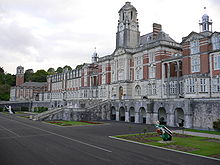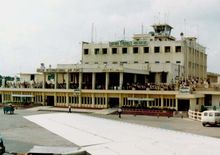- Mahbub Ali Khan
-
Mahbub Ali Khan 
Born 3 November 1934
 Sylhet District, Bengal, British India (now part of Bangladesh)
Sylhet District, Bengal, British India (now part of Bangladesh)Died 6 August 1984 (aged 49)
 Dhaka, Bangladesh
Dhaka, BangladeshAllegiance  Pakistan (till 1971)
Pakistan (till 1971)
 Bangladesh (after March 1971)
Bangladesh (after March 1971)Service/branch Bangladesh Navy Years of service 1952–1971 Pakistan Navy
1971 -1984 Bangladesh NavyRank Rear Admiral Rear Admiral Mahbub Ali Khan (Bengali: রিয়ার অ্যাডমিরাল মাহবুব আলী খান) (3 November 1934 – 6 August 1984) was the Chief of Naval Staff of the Bangladesh Navy since 1979 till his death in 1984. He is known for his heroic actions done for his country. Under him the South Talpatti sandbar and other emerging islands in the Bay of Bengal, over which both India and Bangladesh claimed sovereignty, remained under the authority of Bangladesh. He is also known for bringing down the pirates in the Bay of Bengal and was responsible for maintaining the security of the Bay and the Sundarbans.
Contents
Early life
Mahbub Ali Khan was born on 3 November 1934 in Birahimpur of the Sylhet District in north-east Bangladesh. He was the youngest child among the three children of Ahmed Ali Khan and Jubaida Khatun. His father was the first Muslim Barrister in Sylhet as who became a barrister in 1901 and was a Member of Legislative Assembly of All-India Muslim League, who was also the President of the Assam Congress during the British rule in the sub-continent. Mahbub Ali Khan's grandfather was an eminent doctor in Calcutta and was personal physician to the Bihari Shia lawyer-politician Syed Hasan Imam, the top barrister of Calcutta High Court and leader of the Indian National Congress. Mahbub Ali khan's great-uncle Ghazanfar Ali Khan OBE ICS was the first Muslim Cambridge graduate from Sylhet. Mahbub was also the cousin of General M. A. G. Osmani, the Supreme Commander of Bangladesh Forces during the Bangladesh Liberation War. Mahbub Ali Khan spent his childhood in the Sylhet District and Kolkata. After the partition of India (1947), his family moved to Dhaka in East Pakistan. He received his primary education in Kolkata and Dhaka and has spent his college time in Dhaka College. Later he took a law degree. So for four generations, the Khan family have been taking qualifications in law and medicine a feat very rare among Bengali Muslims. Mahbub's niece is the Harvard educated Irene Khan, former head of Amnesty International.
 For higher naval training Mahbub Ali Khan went to finish his graduation at Britannia Royal Naval College in Dartmouth, England
For higher naval training Mahbub Ali Khan went to finish his graduation at Britannia Royal Naval College in Dartmouth, England
In 1952 Mahbub Ali Khan joined the executive branch of the Pakistan Navy as a cadet. Mahbub Ali Khan received his training as a cadet in a military school in Quetta of West Pakistan. For higher training he went to finish his graduation at Britannia Royal Naval College in Dartmouth, England. After his graduation he married Sayeeda Iqbal Manda Banu in 1955. They had two daughters – Shahina Khan and Zubaida Khan. On 1 May 1956, Mahbub Ali Khan received his standing commission. In 1960 he became the Gunnery officer of P.N.S (Pakistani Naval Ship) Tughril. In 1963, Elizabeth II of the United Kingdom awarded him for being a disciplined officer. In 1964 he became the torpedo and anti-submarine officer of P.N.S Tippu Sultan. From 1967-68 he served the Pakistan Navy as the Joint Chiefs’ Secretariat Staff officer in the Defense Ministry in Rawalpindi of West Pakistan. In 1970 he became the officer in charge of the torpedo and anti-submarine school in the P.N.S Himalaya and in the West Pakistani city of Karachi he served as the Seaward defence officer.
Life during the Liberation War of Bangladesh (1971)
During the 1971 war, when East Pakistan became Bangladesh and then went to war with West Pakistan for independence, Mahbub Ali Khan, at that time, was still staying in West Pakistan. Because of his patriotism towards Bangladesh, Mahbub Ali and his family was placed under house arrest by the Pakistan government. Even after the war was over, Mahbub Ali was still placed under house arrest for two more years till 1973, when he was able to escape from West Pakistan to Afghanistan. From Afghanistan he went to India and then finally to his motherland, Bangladesh.
In October 1973, in Bangladesh Mahbub Ali became the first Bengali to be appointed as the commandant of the Mercantile Academy of Chittagong. In February 1976 he became the Assistant Chief of Naval Staff (Operations and Personnel) of the Bangladesh Navy. In December 1976 the Royal Navy of the United Kingdom sold a Salisbury class frigate to Bangladesh which came to be known as B.N.S (Bangladeshi Naval Ship) Umar Farooq. The ship arrived in Bangladesh on 27 March 1977. Mahbub Ali Khan became the captain of the B.N.S Umar Farooq and with this ship he travelled to the ports of Algeria, Yugoslavia, Egypt, Saudi Arabia and Sri Lanka. On 4 November 1979, Mahbub Ali Khan became the Chief of Naval Staff of the Bangladesh Navy and on 1 January 1980 he grew to the rank of Rear Admiral.
Rear Admiral Mahbub Ali Khan worked hard to modernise the Bangladesh Navy. In the aftermath of the Bhola cyclone in 1970, a small uninhabited offshore sandbar landform called the South Talpatti sandbar emerged in the Bay of Bengal. Although South Talpatti was uninhabited and there were no permanent settlements or stations located on it, both India and Bangladesh claimed sovereignty over it because of speculation over the existence of oil and natural gas in the region. Under Rear Admiral Mahbub Ali Khan, the sandbar remained under Bangladeshi authority. During his time the Bangladesh Navy was also able to bring down the pirates in the Bay of Bengal. Mahbub Ali Khan also took possible measures to maintain the security of the Sundarbans.
Involvement in Politics and relationship with the Political figures of the country
 Rear Admiral Mahbub Ali Khan shaking hands with President Ziaur Rahman
Rear Admiral Mahbub Ali Khan shaking hands with President Ziaur Rahman
During the time of Ziaur Rahman's rule, besides being the head of the Navy, Mahbub Ali Khan also served as the minister of telecommunications. Mahbub Ali Khan was also a member of President Zia's temporarily formed party called JAGODAL. In 1982, when martial law was imposed in Bangladesh, Rear Admiral Mahbub Ali Khan was appointed as the deputy chief martial law administrator of the country. At that time he also became an adviser of the Ministry of Communications. From 10 July 1982 to 1 June 1984, he served as a minister of the Ministry of Communications. Till his death, he served as the Minister of Agriculture in the country. During the time of President Hussain Muhammad Ershad's rule, besides being the Minister of Agriculture, Rear Admiral Mahbub Ali Khan also kept on his efforts to continue the Green and Agricultural Movement, which was started by President Ziaur Rahman.
Mahbub Ali Khan had good relationships with almost all the great leaders of the country. After his return to Bangladesh, after the Liberation War, Sheikh Mujibur Rahman specially appointed Mahbub Ali Khan to modernise the navy. Rezaur Rahman, elder brother of President Ziaur Rahman, was a colleague of Mahbub Ali Khan in the navy. So, Mahbub Ali Khan also had some good relationship with President Zia as well. Zubaida Khan, the younger daughter of Mahbub Ali Khan is also the wife of Tarique Rahman, the elder son of President Ziaur Rahman.
Death
 Mahbub Ali Khan had a heart attack in the Tejgaon Airport, while investigating an air crash in the airport area
Mahbub Ali Khan had a heart attack in the Tejgaon Airport, while investigating an air crash in the airport area
On 6 August 1984, Rear Admiral Mahbub Ali Khan went to the Tejgaon Airport in Dhaka to investigate an air crash in that area. There, while investigating the air crash, Mahbub Ali Khan had a heart attack and he was quickly taken to the Combined Military Hospital (CMH), where he died at the age of 49. His burial place is at the Banani defence graveyard in Dhaka.
Military offices Preceded by
Rear Admiral Musharraf Hussain KhanChief of Naval Staff
4 November 1979 - 6 August 1984Succeeded by
Rear Admiral Sultan AhmedCategories:- Bangladesh Navy
- 1934 births
- 1984 deaths
- Bangladeshi military personnel
Wikimedia Foundation. 2010.
